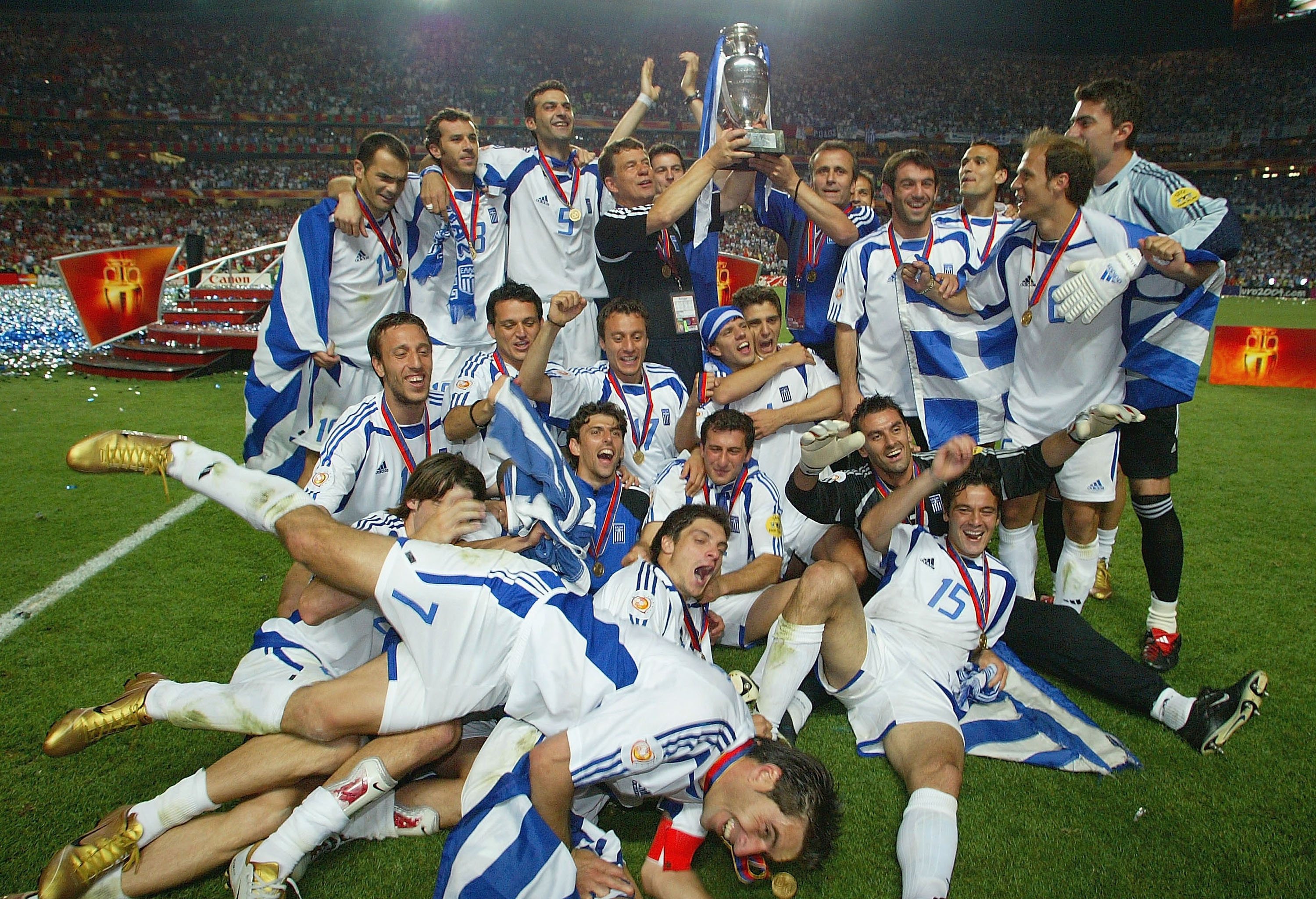Remembering the Greek Miracle of Euro 2004

Image Courtesy: © Gettyimages
“Pain was their body's way of telling them that they'd pushed themselves to their limits — which was exactly where they were supposed to be.”
Those lines from the autobiography of an ex-US Navy SEAL officer would have summed up Greece’s condition after 56 minutes at the Estadio de Luiz in Lisbon on the 4th of July, 2004. There were fireworks that day, but not so much in the skies as on the green lush pitch, which formed the setting of the Euro 2004 final. There were no known Americans in sight, however, as the ferocious Portuguese forward line powered by the scintillating Luis Figo, the magnificent Deco, and young sensation Cristiano Ronaldo hammered away at the Greek defensive line. It was like watching a pack of wolves tearing away its enemy, a single unit of flesh, blood and survival instinct.
Any defense in the world would have given up in light of that onslaught, not the Greeks, though, not on that night. It was as if, the Greeks were not human anymore. That one day 15,000 Greek fans roared for their team’s fortunes for so long. But you could’ve mistaken them for more, an entire nation doused in the blaze of the Olympic shame and Football League doping scandals, concentrated their energies into the television sets, kicking every loose ball, rushing into every 50-50 challenge and heading away every ball that threatened to danger their goal.
This wasn’t just 11 men on the pitch fighting for glory. This was a population of 11 million people fighting to find hope at the end of a storm. The eleven men on the pitch had become more than just men, they’d become an embodiment of pure will.
Vassilios Tsiartas, who was used on the left of midfield as an impact sub throughout the tournament, spoke about his side’s team talk before the final. He said:
"We told each other that this was the only opportunity that we would get to write history. We knew we would never be able to recreate what had happened. We vowed then to give everything to make sure we did not need to."
They had indeed given everything so far in the final. Defiance had been a recurring theme in their Euro 2004 campaign as the Czech Republic would have learned to their peril in the semi-final clash with the Greeks. Greece coach Otto Rehhagel had managed to do the unthinkable as he stifled the Czech attack of Jan Koller, Milan Baros, and Pavel Nedved, with Tomas Rosicky and Karel Poborsky behind them. This was an attack that had scored 10 goals in 4 games (7 goals in 3 games in the Group Stage and 3 in the quarter-final against Denmark).
(Also read - Euro 2016 | Missing players XI; Benzema, Kompany and Pirlo among absentees)
Michel Platini could not believe his eyes as the Czech attack he had singled out for praise the day before was tamed for more than the regulation 90 minutes by a determined Greek team, which hung on to the match with sheer desire for most of the game. The Greeks came to life at the end of the first half of extra time as one of the heroes of the match, Traianos Dellas, scored the only ‘silver goal’ in the history of football to send Greece into the final.
"That was when I thought we could actually win it," said Tsiartas.
To fully comprehend the weight of this incredible moment, when for the first time the Greeks truly believed that they could go on to win the Euros, one needs to realize this.
Before, Euro 2004 Greece had not won a single game at a major footballing tournament finals ever in their entire history. They had not even qualified for any of the editions of the UEFA European Championships since their last appearance in the tournament in 1980. They also came into the Euro 2004 after suffering an embarrassment in their last major tournament appearance in the 1994 World Cup after they exited the competition without registering a single win in the United States.
"The target at the start was to win a game," said Tsiartas, "Just one game. It was something none of the national teams had been able to do [at a major finals].”
And yet, here they were; one step away from winning the tournament. Winning with nothing more than defiance to their credit, a refusal to give up and give in to the occasion even when the entire world believed it was beyond them. . Greece were 80 to 1 outsiders for winning the tournament before it began.
"We only had the weapons we had been given," said left-back Takis Fyssas. "We did not have a Zidane, or Simao, or Cristiano Ronaldo. We only had hard work, sacrifice, determination and that family spirit.
No, they did not have a Zidane or a Henry or Pires or Thuram or Lizarazu or even a Makelele, a Trezeguet or a Barthez. This collection, however, formed the spine of the team they had faced in the quarterfinals just prior to the Czech assault. The French were rampaging favorites for the tournament title. They were overwhelming favorites to end the Greek dream, the men from Greece had already overachieved unreasonably in the eyes of many.
No, they did not have a team of world class players, game changers or for that matter a chance in hell to overpower the defending champions, France. However, they did have each other.
"It was like a family," says Fyssas. "It was not one of these national teams with 55 players [in qualifying] We had 20 or so who were always in the squad -- he would bring two or three more along to have a look at them -- and so we were very close. We would sacrifice everything for each other."
And the coach was no exception.
Otto Rehhagel was notorious for his tactical rigidity. If he chose a system for a team to play by, they would have to live or die by it. The Greeks marked zones all through the group stages, man marking had become old fashioned and the preferred set up was a back four that would give them the extra man at the back to mop up.
However, when faced with the proposition of the French and their team of majestic players attacking their goal, the squad pleaded with Rehhagel to consider a change of plan.
Otto Rehhagel relented. He made the changes necessary to keep the French at bay. He handed right-back Giourkas Seitaridis the responsibility of man-marking Thierry Henry whose drifting runs inwards from the outside left were seen as a recipe for trouble for opposing defenders. Greece for this game chose to play a flexible system, one which saw the four-man defense turn into a three-man defense (with Seitaridis on Henry) when needed with left back Fyssas and central midfielder Zagorikas providing width for the Greek side on the counter attack.
It was indeed Zagorikas who burst down the right and raced past Lizarazu before sending an inch-perfect cross to Angelos Charisteas who headed France out of Euro 2004.
Rehhagel had said before the game against France, that they would need a miracle to win. This became the first of many in the days to come.
"We were all equals together," said Vasilis Tsiartas in hindsight. "We were all connected. It was unique."
It was unique indeed and it had all begun in the group stages, where Otto Rehhagel would have feared the end of Greece’s run after Russia defeated his side 2-1 in the final group game. The Greek side had come from a goal down to draw the game against the Spanish before that, having left the group on razor’s edge with a range of permutations and combinations possible in the final match day. However, Portugal beat Spain in the final game of the group to send themselves through but little had they known at the time that the one goal would go on to set destiny afoot.
It seemed somewhat poetic that the miraculous journey had begun at the same point that it was destined to end. The first game of Greece’s group and the tournament proved to be a contest between the eventual finalists. The game was pulsating, as the hosts Portugal were grounded by a humble Greek side that won 2-1. They spent the next hours, celebrating the fact they had created history, by winning their first ever game in a major tournament. There was more to it, but they would never have known. But by the time they beat the Czech in the semi-final,there was a sense of purpose attached to every word the Greek squad shared with each other.
(Also read - Euro 2016 | The ultimate quiz to test your knowledge of the European Championship)
"We all admitted that if you had said to us before the tournament that we would make the final, we would have said yes, that's fine, we don't care if we win or lose," says Fyssas. "That would have been a special success. But once we were actually there, we were so determined to make that final step. We left that meeting and knew we had to finish the job off."
56 minutes into the final, every Greek player had only one thing repeating in their heads, the need to “finish the job off”. Angelo Basinas picked up the ball with intent at the prospect of delivering a set piece in the 57th minute, and the Greek team ran up in numbers to meet the corner. It didn’t matter who went. Everyone in the stadium knew to whom the ball was going to, Basinas himself must have been aware that everyone knew what he was about to do. It did not deter him. He had to put the ball in for his teammate. He put everything into it as the ball swerved into the area ahead of the near post and sure as rain, there was Angelos Charisteas, rising above Costinha and almost in slow motion pushing the ball past Ricardo, the Portuguese keeper.
Filipe Scolari was stunned, the Portuguese fans were stunned, and even Rehhagel took a second to register what had happened. Greece had scored.

Over the next half hour, Luiz Filipe Scolari hit the Greeks with everything he had. On came Rui Costa for Costinha. It did not stop there. Nuno Gomes also arrived a few minutes later. Deco, Rui Costa, Figo, and Cristiano Ronaldo tried their best to break down the Greek defense, but whenever they attacked they found the blue and white wall standing strong. Cristiano shot high and wide, Rui Costa had his shot parried by the keeper, Figo’s shot rebounded and went out behind the goal. The Referee’s whistle blew into a stunned silent night and joy erupted.
There were tears, there was laughter and there was delirium. Greece had done the unthinkable. They had become champions.
Such was the range of emotions that drove through all of us who witness this miracle that day, that it remains so vividly in our memories 12 years on. The world famously echoed what the team bus read the next day:
"Ancient Greece had 12 gods. Modern Greece has 11."
Do we find these 11 New Gods at Euro 2016 this year? Bets on Albania, anyone?
As a neutral, here’s to the hope for another Miracle.
Image Courtesy: © Gettyimages
You can help Slum Soccer send 20 of our most talented footballers to represent INDIA at Homeless World Cup at Glasgow. Click here to know more.
